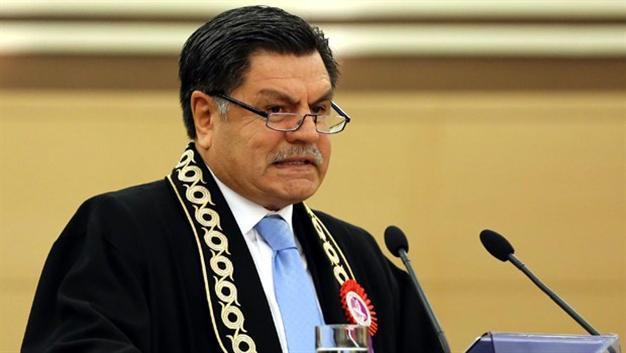Retrial 'only way to correct,' top judge says on key ruling in coup plot case
Taha Akyol - takyol@hurriyet.com.tr

Constitutional Court Head Haşim Kılıç
I asked for the Constitutional Court’s justifications regarding the Balyoz (Sledgehammer) and Hanefi Avcı cases to the head of the Court, Haşim Kılıç. The reason I asked was because the published justifications are very short. The information provided by Kılıç is as follows:
According to the short published reasoning, the fact that then-Chief of General Staff Gen. Hilmi Özkök and Commander of the Land Forces Gen. Aytaç Yalman were not heard by the court is a “violation of the right to a fair trial.”
There are other witnesses in the file who were not listened to, but Kılıç explained why these two were important:
“In the court’s verdict, it is openly stated that a coup attempt was made, but it was prevented by Özkök and Yalman. How did the court obtain this information; what is the evidence? There is no document in the file showing this. In this case, Özkök and Yalman must have been heard as witnesses and they should have been asked. The hearing of Özkök and Yalman as witnesses, two people who are referred to in the final decision about how much important they are, might have affected the entire outcome. In this respect, the fact that these two important witnesses have not been heard even though the defense demanded has been acknowledged as a violation.”
Kılıç’s words are so clear that no comments are necessary.
Digital evidence Kılıç said, “We did not conduct an investigation on whether or not the digital evidence was valid or make a decision about that. This matter totally falls on the jurisdiction of the Supreme Court of Appeals; we do not have any authorization. What we inspected were the claims that the digital evidence was as important as to constitute a basis for imprisonment and was not adequately discussed in the court and that the complaints of the defense were not resolved.”
In other words, it was a violation of the procedure.
Kılıç said there were many technical reports on the evidence: Four of them are expert reports and others are reports by specialists presented to the court by the defense. There are significant contradictions among them. The court did not credit the reports from specialists, as they were “one-sided and constituted an interference with the judge’s authority.” However, a final technical inspection should have been conducted to eliminate the contradictions.
Judge Kılıç also stated that in the justification of the decision for imprisonment from the court “there were contradictions while referring to the evidence.”
Retrial Another important factor Kılıç said is this: “The shortcomings in the hearing of the witnesses and in the discussion of the evidence may affect all of the 230 defendants.” For this reason, the violation of the right to a fair trial is in question in terms of the entire file.
What next, then, I asked Kılıç:
“The right to fair trial has been violated in these two aspects. The only way to correct them is a retrial; there is no other way.”
That was why the “short decision” was written swiftly and sent to the relevant court. Because the decision of the Constitutional Court covered the whole case, the Fourth Criminal Court ruled for the release of all of the defendants.
Hanefi Avcı The Court’s justification of the decision regarding Hanefi Avcı is “prolonged pre-trial detention.” Avcı’s file is in the Supreme Court of Appeals; his being detained for such a long period was considered a “violation of the right to a fair trial.”
As a matter of fact, the file is complete; it is at the high court; tampering with evidence is not possible. A person like Avcı, will he be involved in an illegal activity after he is released?
It was a mistake that Avcı was kept under arrest until today.
Universal law As Turkey, we are living and learning the significance of high judicial values such as “universal law, impartial justice and the right to fair trial.”
In this, our Constitutional Court is undertaking a pioneering role, because with the 2010 referendum the Constitutional Court was structured according to universal law and it makes its decisions in accordance with the European Court of Human Rights (ECHR) practices. The decisions to cancel out previously ruled decisions, as well as individual applications, both of which irritate the government, are all in line with ECHR practice.
When the time comes, I believe the ECHR will honor the Turkish Constitutional Court, like with the German, French and Spanish constitutional courts, saying it is practicing universal law.
And this will be Turkey’s honor.
Everybody should take the Constitutional Court as an example in defending impartial and independent justice; including the Supreme Council of Judges and Prosecutors (HSYK) which has allowed its independence to be bruised.
